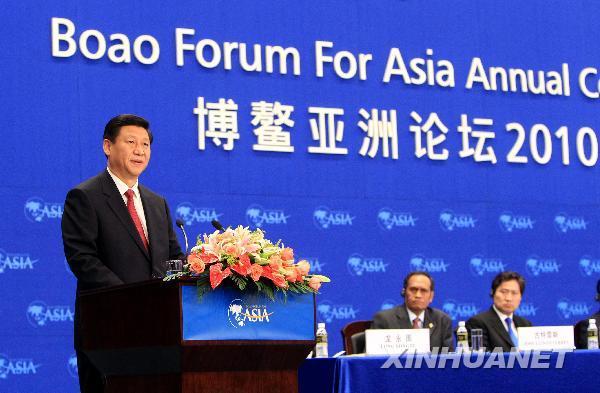China active, serious in tackling climate change:Xi
China has been working "actively and seriously" to tackle climate change and build capacity to respond to it, Chinese Vice President Xi Jinping said Saturday.
 |
|
The Boao Forum for Asia (BFA) Annual Conference 2010 officially opened Saturday morning in Boao in south China's Hainan Province, with a focus on Asia's sustainable recovery from the economic downturn. Chinese Vice President Xi Jinping attends the opening ceremony delivers a keynote speech. |
"Every country has a stake in dealing with climate change and every country has a responsibility for the safety of our planet," Xi told the opening ceremony of the annual Boao Forum for Asia meeting in Boao in south China's island province of Hainan.
"We have joined global actions to tackle climate change with the utmost resolve and a most active attitude, and have acted in line with the United Nations' principle of common but differentiated responsibilities," he said in a key-note speech.
He said Asia, now a major engine behind world economic recovery, had learned lessons from the two severe financial crises in the late 1990s and over the past two years.
"We must further improve the development model, and seek a path of green and sustainable development," he told some 2,000 political and business heavyweights and experts from Asia and around the world.
Xi said China had eliminated a huge amount of outdated production capacities in heavily polluting and energy-gorging industries, including coal-fired power plants, steel mills, and cement, chemical and paper-making firms.
The country has targeted at slashing carbon dioxide emissions per unit of gross domestic product (GDP) in 2020 by up to 45 percent from the 2005 level and raising the proportion of non-fossil energy in total primary energy consumption to 15 percent.
The measures to lower energy consumption alone will help save 620 million tonnes of standard coal in the next five years, which will be equivalent to the reduction of 1.5 billion tonnes of carbon dioxide emissions, Xi said.
He said China's move to speed up transformation of economic growth pattern and adjustment of economic structure is a positive contribution to Asia's and the global fight against climate change.
China, the world's second-largest energy consumer, has cut energy consumption per unit of GDP by 14.38 percent and emissions of sulphur dioxide by 13.14 percent in the four years through 2009.
"That was equivalent to the reduction of 900 million tonnes of carbon dioxide emissions," he said.
The country has become a global leader in clean energy development by having the world's largest installed hydropower capacity and nuclear power capacity under construction by 2009, he said.
It also ranked the first in the world in terms of the coverage of solar water heating panels and cumulative solar photovoltaic power capacity.
Xi said China played a positive role in the success of the Copenhagen conference on climate change and the conclusion of the Copenhagen Accord in December last year.
"We have provided to the Secretariat of the Untied Nations Framework Convention on Climate Change information on China's voluntary actions on emissions reduction and joined the list of countries supporting the Copenhagen Accord," he said.
Xi called on Asian nations to transform economic growth pattern to actively respond to climate change and achieve green development and sustainable growth.
The nations should promote a conservation culture and raise awareness for green development, green consumption and a green lifestyles.
Asia has huge potential for reducing energy consumption and improving energy efficiency, although it lagged far behind the world's advanced levels in the aspect, Xi said.
The developed countries should help to facilitate technological transfer and share related technologies on the basis of intellectual property protection, he said.
He also urged to quicken low-carbon technology development, promote energy efficient technologies and raise the proportion of new and renewable energies in the energy mix.
 0
0 







Go to Forum >>0 Comments